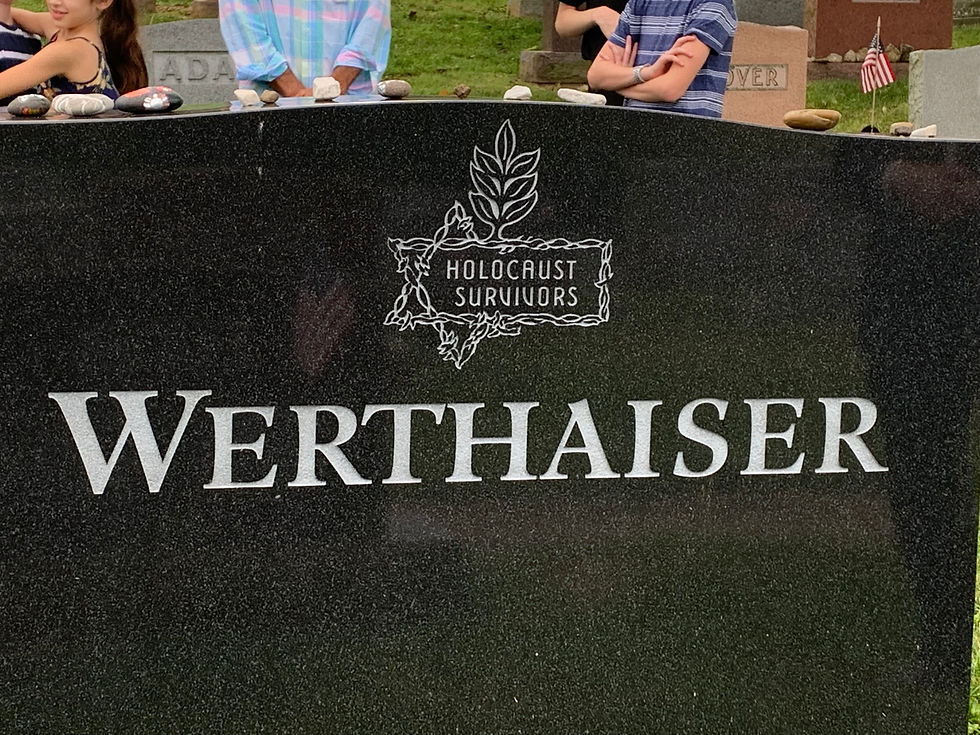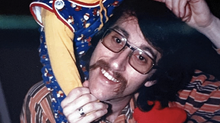We Remember
- Melissa W. Hunter

- Jan 27, 2022
- 5 min read
Updated: Jan 28, 2022
Today is International Holocaust Remembrance Day. It is so important that there is a day devoted to the memory of all those who perished in the Holocaust, because there are so many people who either don't know about the Holocaust or are misinformed about the facts of this dark period in history. In 2020, a nationwide survey showed "a worrying lack of basic Holocaust knowledge among adults under 40, including over 1 in 10 respondents who did not recall ever having heard the word Holocaust before.
"The survey, touted as the first 50-state survey of Holocaust knowledge among millennials and Generation Z,
showed that many respondents were unclear about the basic facts of the genocide. Sixty-three percent of those
surveyed did not know that 6 million Jews were murdered in the Holocaust, and over half of those thought the
death toll was fewer than 2 million. Over 40,000 concentration camps and ghettos were established during World
War II, but nearly half of U.S. respondents could not name a single one." -NBCnews.com
As my readers know, the subject of the Holocaust isn't just another chapter in history for me . . . it is something much more personal. It was an event that directly affected my family, forever changing the trajectory of their lives and the lives of those who came after them. If there is such a thing as cellular memory, I feel the truth of it. I have been directly impacted myself. For my entire life, I have felt a deep connection to this moment in our family's history. I may not have experienced the events of the Holocaust firsthand, but they are very much a part of who I am. They are part of the fabric of my own being. For this reason, I am often disheartened by the lack Holocaust education in schools, and I am scared by the rise in antisemitism today.

"Knowledge is power." "There is only one good, knowledge, and one evil, ignorance." I believe this 100%. Which is why I believe it is so important that Holocaust education should be included in classroom curriculum. Two years ago, I was asked to sit on the Diversity, Equity, and Inclusion Council for my local school district. I was extremely honored and excited to think that my input might make a difference and have some influence over how the subjects that fall under this umbrella might be taught in school. The council consists of individuals in our community who represent varied cultures, religions, and ethnicities, as well as those who speak for students with disabilities. It is comprised of parents and educators and community and spiritual leaders. It is a group of like-minded individuals who want to shape education for the better. It is an advisory board for the superintendent who I believe truly wants to do what is right and help education evolve as society evolves.
I believe the reason I was asked to join the group is because I am a local reformed Jewish author and parent in the district who writes about her Judaism. A rabbi of a more orthodox branch of Judaism was invited this year as well. Together, we represent the Jewish faith in our district.
And there have been instances of antisemitism within the district, both overtly (comments made on the school grounds, antisemitic symbols spraypainted on school property) and in small ways. Recently, my daughter mentioned that she noticed a swastika carved into the desk where she sits for study hall. She told me in such a casual way that I was taken aback. "What do you mean?" I asked, letting the words sink in. "Yeah," she continued, "I noticed it today. It's faint, but it's there."
"Can you take a picture of it for me?" I asked.
"Sure," she said with a shrug. I was immediately concerned, not only about the presence of a swastika on the desk but also about the fact that she didn't seem bothered by it. She noticed my reaction and said, "Mom. It's not a big deal."
"But it is," I said. "You shouldn't have to see that. I am going to contact the school."
"Don't," she insisted. "I see it all the time. They can't do anything about it. It's just graffiti."
This made me truly sad. It's not just graffiti, I thought. It's so much more.

And today, on International Holocaust Remembrance Day, my daughter shared a conversation she overheard in her History class. She said they were studying for a quiz on World War Two, and two students behind her were discussing the photos of victims of the Holocaust.
"How do we know they aren't photoshopped?" One of the students asked.
"Dude, they're not," his companion said.
"But weren't there also black and gay people in the concentration camps?" The first student asked. "I don't think so," the second one replied. I was baffled, both by the idea that they would question the validity of the historical photos, and their lack of information about all the victims of the Nazi regime. "Did you say anything?" I asked, but my daughter shook her head. I didn't blame her. I know how hard it is to speak up in such situations. To me, this is just another reason why the Holocaust needs to be better taught in schools. In college, I was Judaic studies minor and took a course on the History of Judaism. I distinctly remember my professor stressing the fact that Judaism was a religion, not a race. Yet we are often thought of as the Jewish race. Perhaps that is because, as a religion, we carry a heavy history, a shared culture, and a strong sense of heritage. We live in the diaspora and make up such a small percentage of the population today, yet we are bonded by language, culture, food, and prayer. Whenever I meet someone Jewish, we inevitably end up playing Jewish geography!
In many ways, I feel we are overlooked as a group when hate crimes and prejudice in society are addressed. I don't understand this, because we have been historically discriminated against. I often think, "What about us?" The day of my daughter's Bat Mitzvah, in another synagogue similar to our own in Pittsburgh, a shooter came into a peaceful morning service prayer and fatally shot eleven congregants. I've written about this in the past, and it is surreal that a day my family will always remember as something good and happy will be forever linked to the deadliest attack on the Jewish community in the United States.
More recently there was the hostage standoff at the synagogue in Colleyville, Texas. Again, it was during a peaceful service that a man overtook the temple and held congregants and the temple's rabbi at gunpoint. Today, along with being spiritual guides for their congregants, rabbis are trained in handling hostage standoffs and other acts of violence that might occur during worship. I often saw police standing at the door whenever I took my children to temple for Sunday school and Hebrew school and especially the High Holiday services. While this was something I got used to, I often asked myself why I would have to get used to it.
Antisemitism exists, and that is why it is so important that the lessons of the Holocaust not be forgotten. For Jews or any other people.
I mean, I get it. It's a hard subject to deal with. The mass extermination of six million individuals is a stain on the human condition. Yet minimalizing the subject in education or the news, or not shedding light on even the smallest acts of antisemitism, shouldn't be allowed. That is why days like today are so important, and the stories of those who experienced the atrocities of the Holocaust should be told (As I writer, I often hear there are too many Holocaust stories, an issue I plan to write about in the future). As my daughter said, each of the six million who perished once had a voice. And until we have six million stories in the world to represent those voices, there can never be too many Holocaust stories.

In memory of my grandparents, Harry and Sala Werthaiser, both survivors of the Holocaust.











































Comments